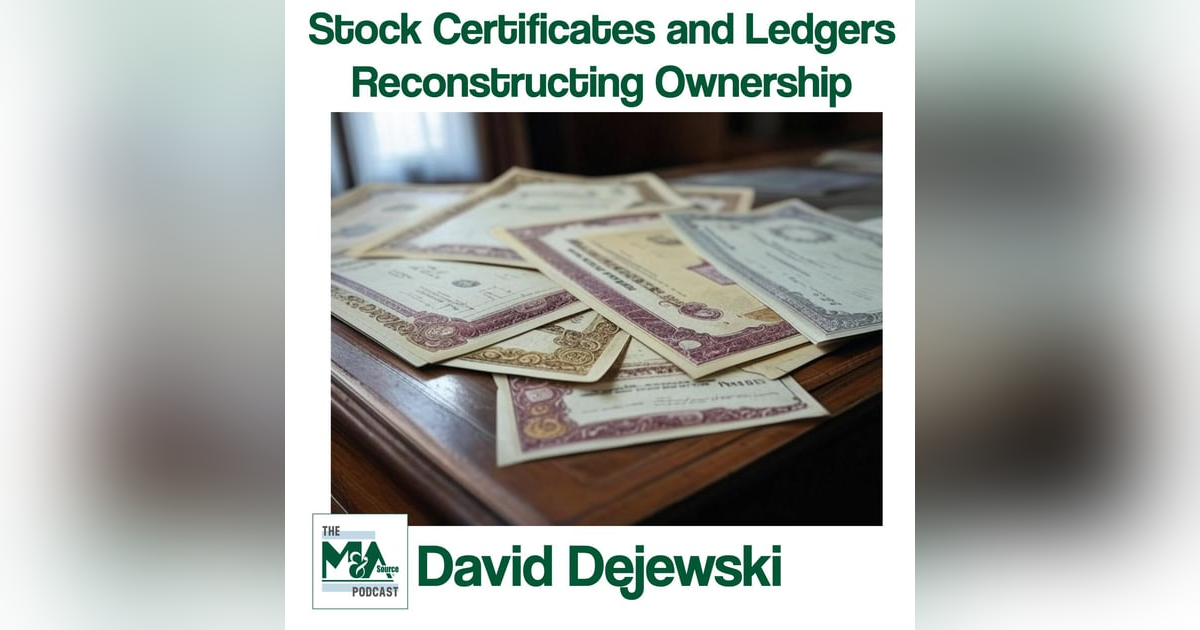Stock Certificates and Ledgers: Reconstructing Ownership


Connect with Us and Access Show Resources: https://snip.ly/mas_interact27
In this episode, David introduces a recent M&A deal that was delayed due to issues with stock certificates and ownership records. He sets up the episode topic on the importance of stock certificates in business sales.
Overview of Stock Certificates
David defines stock certificates, explains their purpose, and outlines the main types (common, preferred, restricted, founders, cancelled). He emphasizes their critical role in documenting ownership.
Types of Stock Certificates in Detail
A detailed breakdown of each stock certificate type, including who typically receives them, their purpose, and pros/cons:
- - Common stock
- - Preferred stock
- - Restricted stock
- - Founder shares
- - Convertible/redeemable shares
Reconstructing Ownership History
David explains how to piece together a company's equity history when records are incomplete, including examining tax filings, cap tables, emails, and other documents.
Due Diligence and Post-Closing Issues
Discussion of potential problems that can arise during due diligence or after a deal closes if stock certificate records are not properly maintained.
Conclusion
David summarizes key takeaways and encourages listeners to pay close attention to stock certificate issues in M&A deals.
Questions/Answers
Q: What is a stock certificate?
A: A stock certificate is a physical or electronic document that represents ownership of shares in a company. It usually includes the shareholder's name, number of shares, class of stock, issue date, and signatures of corporate officers.
Q: What are the main types of stock certificates?
A: The main types are common stock, preferred stock, restricted stock, founder shares, and cancelled certificates.
Q: Why issue restricted stock?
A: Restricted stock is issued to incentivize long-term commitment and align the interests of key employees or executives with the business. It often comes with a vesting schedule.
Q: What should you do if there is no stock ledger?
A: You need to become a detective and reconstruct one by examining tax filings, cap tables, emails, board minutes, founder documents, and banking/legal correspondence.
Q: What kinds of issues can arise during due diligence related to stock certificates?
A: Issues can include undocumented liquidation preferences, missing board authorizations for share issuances, and unexpected vesting accelerations upon sale. These can lead to deal delays or restructuring demands.
The learn more about M&A Source, please visit us at https://MASource.org

Managing Director / Host of the M&A Source Podcast
David Dejewski is the host of the M&A Source Podcast and a business leader with a diverse background in media, communications, and strategic leadership, including significant contributions to the U.S. Department of Defense. David’s media journey began in 1994 when he produced Images and Words, the Other Side of D.U.I., a 22-minute film aimed at educating young people about the dangers of drinking and driving. Supported by organizations like the US Navy and the College of Charleston, the project exemplified his early commitment to impactful communication.
David has since produced three successful podcast programs, the first of which launched in 2005 to address military healthcare leaders globally while serving as the Chief for Defense Business Transformation in the Military Healthcare System. During his tenure, he led efforts to establish a business transformation process that reviewed over $1 billion in investments, sending $200 million back to the Treasury due to redundancies or inefficiencies. David’s role was critical in aligning business IT investments with enterprise architecture, ensuring compliance, and delivering results that saved taxpayer dollars. His second podcast expanded his reach to a global audience as chair of a 501(c)(3) organization, where the show still receives hundreds of monthly downloads.
In his current role as Managing Director at Transworld Business Advisors, David specializes in problem-solving, business sales, M&A, and franchising for small and mid-market companies. His leadership extends to the M&A Source, where h…Read More








